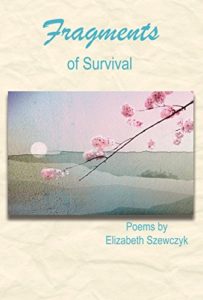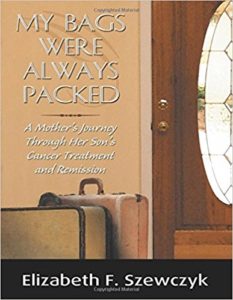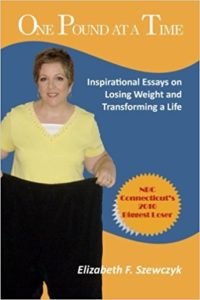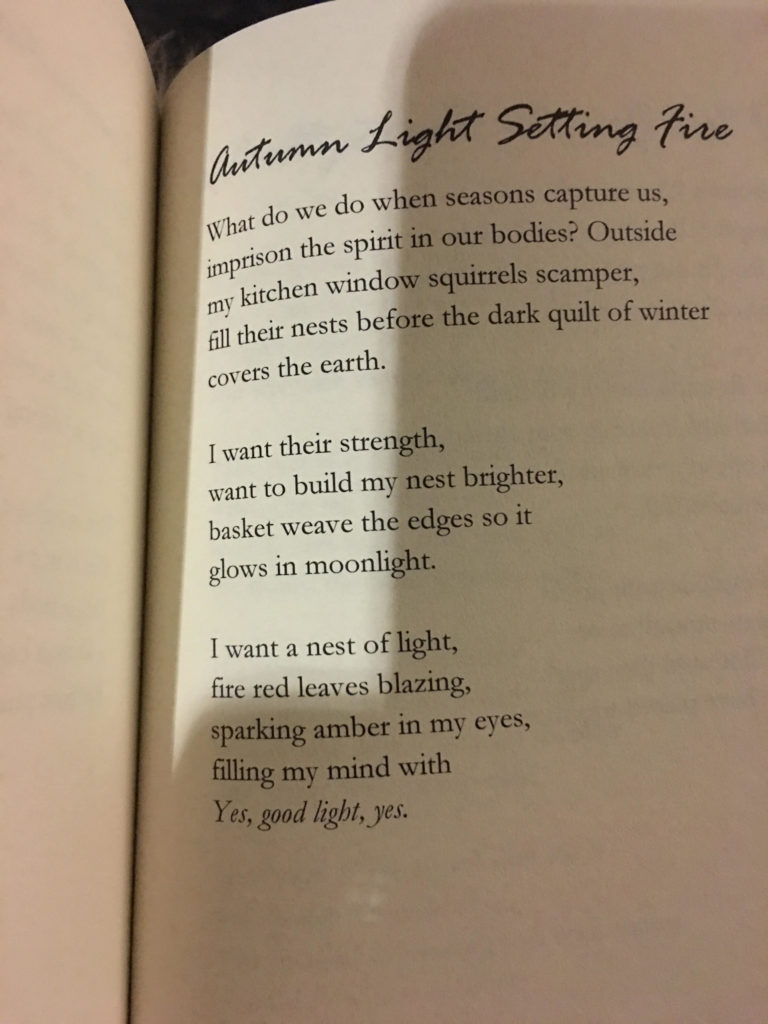
![]() Elizabeth Szewczyk is a writer of poetry and prose whose books include This Becoming, On Burying Moths and Calendars, and My Bags Were Aways Packed (A Mother’s Experience Through her Son’s Cancer Treatment and Remission). Her work has appeared in The Red River Review, Paper Nautilus, Poetry for Poets, Pulse (The American Medical Association journal), Sanskrit, Shapes, Westward Quarterly, Chanterelle’s Notebook, Freshwater and others. She is a recipient of the Connecticut Celebration of Excellence award in writing and literature, and the 2008 first place winner of the annual Shapes poetry contest. Her new collection of poetry, Fragments of Survival, is incredibly powerful. I am so pleased to share with you my recent interview with Elizabeth. I hope you enjoy.
Elizabeth Szewczyk is a writer of poetry and prose whose books include This Becoming, On Burying Moths and Calendars, and My Bags Were Aways Packed (A Mother’s Experience Through her Son’s Cancer Treatment and Remission). Her work has appeared in The Red River Review, Paper Nautilus, Poetry for Poets, Pulse (The American Medical Association journal), Sanskrit, Shapes, Westward Quarterly, Chanterelle’s Notebook, Freshwater and others. She is a recipient of the Connecticut Celebration of Excellence award in writing and literature, and the 2008 first place winner of the annual Shapes poetry contest. Her new collection of poetry, Fragments of Survival, is incredibly powerful. I am so pleased to share with you my recent interview with Elizabeth. I hope you enjoy.
CM: I know that you are based in Connecticut, which is stunning at this time of the year. Does the change in seasons seem to affect your creative process, and if yes, how so?
ES: Yes it does. I tend to write in Spring and Summer, when the days are longer, and revise in Fall and Winter.
CM: What have been some of your sources of inspiration over the course of your writing life?
ES: I love to write about my family and I also write political poetry. I love the works of Sharon Olds, Patricia Smith, Billy Collins, and Martin Espada.
CM: What do you enjoy about the process of writing? What do you find challenging?
ES: The Beginning—getting my ideas on paper, finding out who or what the poem will be about.
CM: Do you have any particular writer’s rituals that help to settle or center you before you sit down to write?
ES: I always read another poet before I start writing, study what the poem is about, and why the poet wrote it—Sharon Olds is my favorite. I always find something new in her words. Then I sit in my lounge chair—I never write the first draft at a table—with a cup of coffee or tea and the phone turned off.
CM: I learned that you were a college instructor in English and Reading. What are some of your favorite books and what is something you learned about reading from your students?
ES: I loved The Color of Water with my students. It’s a book I would not have chosen on my own. It’s raw and truthful, about the plight of a young African American man’s youth in the 1950’s. Reading is a gift we are given. To be able to say we love to read (and mean it) is an honor we are usually taught by our parents, long before we head to school. Early literacy is one of my passions; before I taught college I was a reading specialist.
CM: You have been published in several poetry journals and have also written and published several books, including a memoir. Can you please tell us a little bit about your first book, My Bags Were Always Packed?
ES: This book is about my son’s diagnosis and treatment of cancer when he was a young boy. The title came about because for six months we packed suitcases and went to the hospital for either chemo or tests. We came home only to wash our clothes. The book tells this story through my viewpoint.
CM: When did you first realize that you needed to write that book? How did you know when it was time to begin?
ES: I kept a diary over that time. When Dan finished chemo I was still on a leave of absence from teaching. I took a Memoir class and passed a few of the diary entries in. The professor (who became my colleague six months later) suggested I turn the diary into a book. I timed the publication with Dan’s five year recovery.
CM: What was it like to experience that first book in print?
ES: It’s both amazing and terrifying to see your name on a book. You have peeled back an emotional layer of your life to share with everyone.
CM: Did getting published change how you viewed yourself as a writer?
ES: When I published the first book (about cancer) I felt I could help others who were experiencing the same journey.
CM: Has your son read the book?
ES: My son, who is now 30, has never read the book; he says he lived through it and it makes him too sad. But he has gone to many speaking engagements with me to promote it, especially to Make A Wish.
CM: What is some of the other feedback you’ve received about that memoir? Have there been any comments over the years that have been particularly meaningful for you?
ES: I’ve received hundreds of thanks from families who read my book while their child was undergoing treatment. The book ends on a hopeful note, with Dan surfing on Oahu as part of his Make a Wish. The best response I received was at a Make A Wish auction. A gentleman told me he would put two copies of the book in every public library, and St. Jude’s Hospital.
CM: I read that you competed in NBC’s Connecticut’s Biggest Loser contest, which you won. That’s quite an accomplishment! Can you please tell us a little about that experience and what that win meant to you at the time?
ES: It was after Dan finished chemo and I had gained a lot of weight from the hospital food. Hospitals love to feed parents of sick children! One morning I saw the advertisement for the contest and entered then and there. I wanted to take care of myself.
CM: Your second memoir, One Pound At A Time, recounts your personal weight loss journey. What is something you hope that people take away from that book?
ES: Caring for and about yourself is the best gift you give yourself and your family.
CM: I know that you were a writer on health and wellness for two Connecticut newspapers. How did that opportunity come about?
ES: I was asked to do this when I began The Biggest Loser. The paper knew I wrote professionally because Dan’s story had been covered.
CM: You are also a recipient of the Connecticut Celebration of Excellence Award in writing and literature. What an honor that is. What did it feel like, to be recognized for your work in such a special and visible way?
ES: It was a great thrill. I was able to spend my summer writing Curriculum for school systems in Connecticut, something I absolutely loved.
CM: What can you tell us about your chapbook of poetry, This Becoming?
ES: This is a small book of family and political poetry. It enabled me to dip my toes into published poetry.
CM: Your first full-length collection of poetry, On Burying Moths and Calendars, is now out of print, but was published by Wasteland Press in 2011. What is your favorite poem from that collection? Why?
ES: There’s a poem called “Listening,” which is about a young teenage girl my son met in the hospital, who was dying of cancer. This poem takes place the morning her mother told me Nikki was dying. We cried over all the “could haves,” and the poem ends with Nikki and Dan being prom dates. I love the poem because it came out gentle, not maudlin. The American Medical Association published it in their journal. It’s still one of my favorites.
CM: Your new book, Fragments of Survival, is about to be released through Big Table Publishing. That’s very exciting news. Congratulations! How do you feel about its upcoming release?
ES: It’s mixed feelings of pride and nerves, and coincidentally so right for the news today. It took me over eight years to write the full manuscript, but there was empowerment in letting it be published.
CM: I was profoundly moved by the poems in Fragments of Survival, Elizabeth. They are so powerful. Can you please share a little bit about the major themes in this collection and how they differ from your previous works?
ES: They tell a story chronologically, in narrative and lyrical poems. The whole book needs to be read (although not in one sitting) to understand the themes of love, loneliness, fear, survival.
CM: You begin the book with a quote by Chris Cleave: “A scar does not form on the dying. A scar means, I survived.” What does that quote mean to you? Why was it the right one to include in Fragments of Survival?
ES: Many times, when people go through trauma, they refer to being “scarred” by the trauma. I think it’s important that we see these scars as symbols of bravery and survival.
CM: As a survivor of childhood sexual abuse, I could relate to many of the poems in your collection, and was particularly struck by “The Beginning.” How does it feel, today, to look back and hold space for that “young child” who was “waiting for life to open”? What do you wish you could say to her now?
ES: That’s one of my favorite poems in the collection. It came so quickly, I call it a “gift poem.” I would tell that child today that she’s more brave than she could ever imagine, and she will save herself with love.
CM: “Portrait of an Abuser as a Young Boy” talks about planting the “Hating Seed.” Can you talk about those sorts of seeds, as you see them?
ES: I believe most (not all) children are influenced by their childhood experiences. This poem talks about the hating seed that was implanted into this boy’s childhood.
CM: One of your poems is titled “Shame.” I believe and have experienced that shame is a deeply damaging and dangerous emotion and state of being. Has that been your experience as well? What have your experiences taught you about shame?
ES: That poem, although not specifically mentioned, is about me cutting my legs after the abuse; I was so desperate for someone to notice. But even if someone did, nothing was ever mentioned, as was the world back then.
CM: How has writing about your experiences been valuable or helpful to you, if at all?
ES: Writing has helped me tell what I could never say out loud. Even when I told my husband, it had to be through writing first.
CM: I really appreciated your poem “Curriculum.” What would you like to see change about the ways in which we talk to children and adolescents about healthy and appropriate behaviors in relationships? How important was it for you to be able to share your wisdom with the young people you were teaching?
ES: I do think slowly, as children are becoming more social media aware, I see this as the parents’ responsibility first, then as a teacher’s assurance to the children, that their safety matters above all else. I wrote this poem after a child confided in me that she had been raped.
CM: As I write this, millions of individuals from around the world are sharing their experiences of #MeToo online, and it’s not surprising, given that sexual violence is a public health epidemic in the U.S. and around the world. As a survivor of sexual violence, what are your thoughts and observations about #MeToo and what is your hope for other victims and survivors?
ES: I’m amazed and saddened by the number of women who have written Me Too on their Facebook walls. At the same time, I know the freedom that comes from giving up the secret. I hope these victims and survivors keep finding their voices.
CM: I loved your poem, “Peace.” The journey to peace can be a winding one for those of us who have experienced any type of trauma. What has been helpful to you in cultivating a sense of peace in your own life and how important has it been to do so?
ES: It’s been a long time—more than five decades—from the abuse to the forgiveness. When I finally began speaking and writing about it (as in the second half of the book), it was after a lifetime of prayer and reflection. I had to forgive him to move on with my life.
CM: I read that, when you aren’t writing, you also enjoy arts and crafts. Any fun ideas for the holiday season?
ES: I put up three trees at Christmas—one for adults of all glass, a Santa tree, and a family tree of handcrafted ornaments.
CM: When will Fragments of Survival be available for purchase? Where can people buy it?
ES: It’s available now on Amazon, or by contacting my Facebook page. 20% of the proceeds will be donated to First Readers, a non-profit association that recognizes early literacy with books and medals.
CM: Where can people learn more about you and your work?
ES: I think Google or my Facebook page.
CM: What’s next for you?
ES: I have a completed fiction manuscript that needs tweaking, and I’m working on a poetry book for mothers.
CM: Is there anything else you’d like to share?
ES: I want to thank Robin Stratton from Big Table Publishing for her help and patience in getting this book out. I found such power in telling my Truth. And thank you, Chloé, for this interview.
CM: It’s my pleasure, Elizabeth! Best of luck with your beautiful book.
—
To purchase a copy of Elizabeth’s new book, Fragments of Survival, please find it on Amazon.
To connect with Elizabeth, please visit her Facebook page.
PLEASE NOTE: The opinions, representations, and statements made in response to questions asked as part of this interview are strictly those of the interviewee and not of Chloé McFeters or Tortoise and Finch Productions, LLC as a whole.



